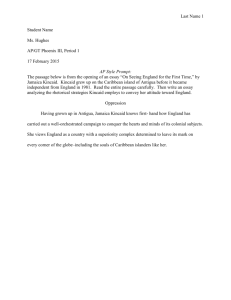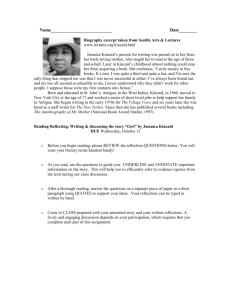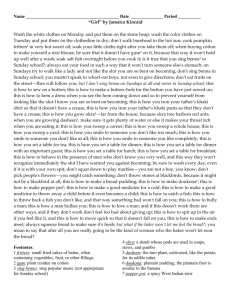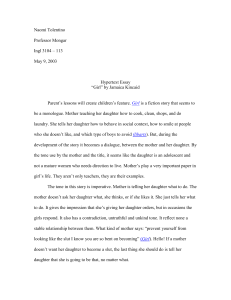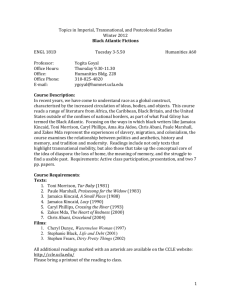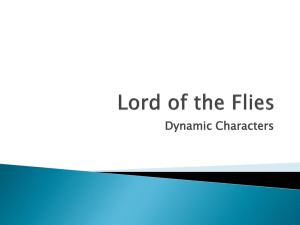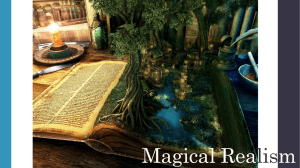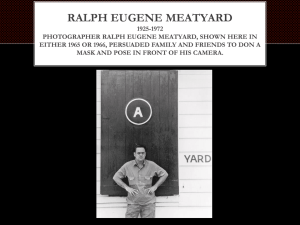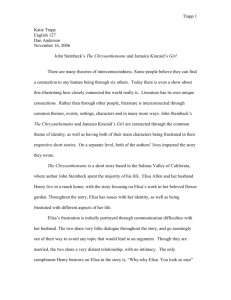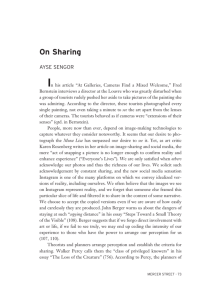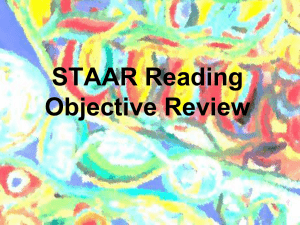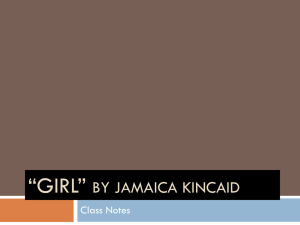Point of View with a Purpose - Brooklyn Technical High School
advertisement
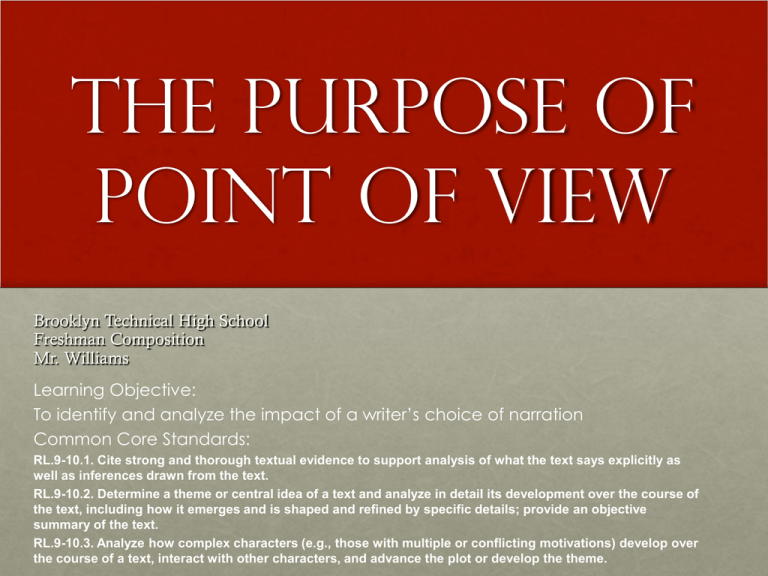
The Purpose of Point of View Brooklyn Technical High School Freshman Composition Mr. Williams Learning Objective: To identify and analyze the impact of a writer’s choice of narration Common Core Standards: RL.9-10.1. Cite strong and thorough textual evidence to support analysis of what the text says explicitly as well as inferences drawn from the text. RL.9-10.2. Determine a theme or central idea of a text and analyze in detail its development over the course of the text, including how it emerges and is shaped and refined by specific details; provide an objective summary of the text. RL.9-10.3. Analyze how complex characters (e.g., those with multiple or conflicting motivations) develop over the course of a text, interact with other characters, and advance the plot or develop the theme. Homework: lord of the flies • Read Chapters 6 and 7. • Answer the following questions. • Chapter 6 • Describe what Sam and Eric saw on the mountain. • What does Jack say about the conch? • What do the boys decide to do about the beast? • Describe Ralph’s reaction to the boys rolling the rocks. • What do you think the beast is? Chapter 7 • Describe Ralph’s reaction to his changing physical appearance. • Summarize Ralph’s daydream. • How does Ralph react to hitting the pig with his spear? • Describe the scene with Robert. How does Ralph react to what is happening? • Summarize the argument between Ralph and Jack. • Describe the tone that Jack and Ralph use in the conversation before they go up the mountain to look at the beast. • What do the boys find on the mountain and how do they react to it? Motivational Activity: Read “Girl” by Jamaica Kincaid Discussion Questions on "Girl" by Jamaica Kincaid Part 1: After reading the story, answer the following questions. • • • • Who is speaking? How do you know? \Where are the speakers? How do you know? What lines in particular attract your attention? What kind of information about the culture and setting is being presented? • Classify the types of instructions that the mother gives in myriad areas of the girl's life: • Home maintenance • Cooking • Personal hygiene and appearance • Manners and conduct in public • Health • Male-female relationships Motivational Activity: Read “Girl” by Jamaica Kincaid Discussion Questions on "Girl" by Jamaica Kincaid Part 2: Read the story once more. Answer the following questions to help you analyze the points of view presented in the story and the effect of different points of view on the mother-daughter relationship. Cite specific examples from the text. • What kind of a person is the mother? What does she value? How do her opinions and the information she presents reveal her personality and her values? • What is the tone of the mother's instructions? • What kind of person is the daughter? • How might this story be different if the daughter had written it? • Predict what their conversation will be like in five years. Who will be speaking? What will be said? • What does Kincaid achieve by writing her story in a way that reveals two points of view, with the emphasis on the voice of the mother? What is the "truth" about the relationship that Kincaid is trying to express? Defining Point of View: the perspective from which the story is told. Omniscient: told by an all seeing narrator who can dip into the head of the characters and reveal past and future occurrences. It gives each character a distinctive voice. It can make the story difficult to follow. Second Person: told by using “you”, making the reader the focal point. It can be used to put the reader in the protagonist’s shoes, but it also removes the feeling of escape that most readers crave. First Person: told by a main character who refers to himself as “I”. It’s the most intimate view for readers as the character confides in the reader. Its narrow viewpoint can hint that things aren’t what they seem,. It is a limited view of events in the story. It needs an intricate character to prevent boredom. Third Person: the most common point of view, told by another character(s), other than the protagonists. It allows the reader to dip into the minds of multiple characters. It can be as personal as first person. While the omniscient narrator simply provides information, the third person is more intimate. See the impact of different points of view on the same story. understanding Point of View: William golding’s “lord of the flies”. Ralph’s point of view would portray him as the responsible hero, not as the idealistic dreamer whose leadership is weakened by his ideality. Jack’s point of view would portray himself as the best leader, not as someone who is uncivilized and primitive. Piggy’s point of view would portray as the sympathetic intellectual, not as the insecure pushover Golding uses an omniscient narrator to create objectivity. This allows the reader to make judgments and prevents the characters from imposing their judgments. developing Point of View: William golding’s “lord of the flies”. Write a two- to three-page short story displaying two different points of view using Jamaica Kincaid's short story "Girl" as a model and inspiration. Feel free to imitate her style of juxtaposing two different voices. Focus on a particular moment as seen by two different individuals. You can choose to make one of the persons yourself and use a moment that has occurred at some point in your life. Possible Character Combinations A teen and a parent Two siblings A grandparent and a grandchild A student and a teacher Two individuals in a romantic relationship Guidelines for Writing Does the writing portray an interesting situation and relationship between two characters representing two very different points of view? Does the writing show emotions, intimate thoughts, and reveal the personality of a particular character with implications and some details to show the point of view of the other character? Does the writing provide ample description through various details? The purpose of point of view The discussion of point of view in literature is one of the touchiest craft-debates among writers and editors. Yet choosing your point of view in literature is one of the most important things you will do as you plan your story. And to do it well, one must be aware of the intricacies of viewpoint and consider how the viewpoint will impact the story. The key to successful choice of viewpoint is understanding thoroughly how your choice of POV will impact your story. -www.the-writers-craft.com
